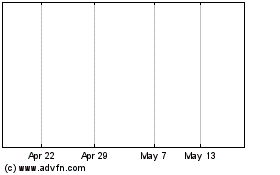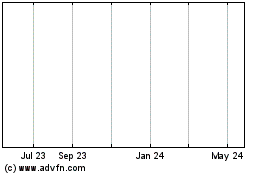TIDMAZN
RNS Number : 2716V
AstraZeneca PLC
01 December 2023
1 December 2023
Update on CRYSTALIZE evidence trials
Discontinuation of STABILIZE-CKD and DIALIZE-Outcomes Phase III
trials
AstraZeneca has decided to discontinue the STABILIZE-CKD and
DIALIZE-Outcomes Phase III evidence trials for Lokelma (sodium
zirconium cyclosilicate). The decision was made due to
substantially increased enrolment timelines and low event rates,
respectively, which made it prohibitive to deliver study results
within a timeframe to meaningfully advance clinical practice.
STABILIZE-CKD and DIALIZE-Outcomes trials are part of the
CRYSTALIZE evidence programme, which includes clinical and
real-world evidence studies researching the potential benefit of
Lokelma in the management of hyperkalaemia (HK) across the
cardiorenal spectrum.
Sharon Barr, Executive Vice President, BioPharmaceuticals
R&D said: "Our ambitious CRYSTALIZE programme continues to
generate evidence to improve the current management of
hyperkalaemia, which we believe leads to better outcomes for
cardiorenal patients when a potassium binder is included in their
treatment regimen. Lokelma is the leading branded potassium binder
globally and continues to benefit a broad hyperkalaemia patient
population to achieve rapid, sustained potassium control and is
well tolerated."
The Company will work with investigators to ensure the necessary
follow-up with patients.
Lokelma is approved for the treatment of a broad HK patient
population in 56 countries worldwide. The decision to discontinue
the trials is not due to safety concerns and the positive
benefit-risk of Lokelma does not change in the approved
indication.
Notes
Hyperkalaemia
Hyperkalemia (HK) can be a chronic condition characterised by
high levels of potassium in the blood, generally defined as greater
than 5 mmol/L.(1,2) Patients with high potassium levels are at
significant risk of cardiac arrhythmias, which can lead to cardiac
arrest.(3) Worldwide there are about 840 million and 64 million
people living with CKD and HF respectively, who are at an estimated
two to three times higher risk of hyperkalemia.(4-7) RAASi therapy
is guideline-recommended to slow down CKD progression and reduce CV
events, but the dose is often lowered or therapy is discontinued
when HK is diagnosed.(8-11) This has been shown to negatively
impact patient outcomes, with mortality rates doubled for patients
with CKD and HF whose RAASi had been down-titrated or discontinued
compared to patients on maximum RAASi dose.(12)
STABILIZE-CKD
STABILIZE-CKD is a Phase III randomised double-blind,
placebo-controlled, multicentre study evaluating the effect of
Lokelma, as an adjunct to optimised RAASi therapy (ACEi/ARB) on CKD
progression in participants with CKD and HK or at-risk of HK.(13)
The study consists of a three -month up -titration period with an
ACEi/ARB to guideline-recommended doses while taking Lokelma
followed by a maintenance phase of two years with repeated
estimated glomerular filtration rate (eGFR) measurements,
originally planned to involve 1360 participants across the world
.
DIALIZE-Outcomes
DIALIZE-Outcomes is a Phase III randomised, double-blind,
placebo-controlled, multicentre study evaluating the effect of
Lokelma on arrhythmia-related cardiovascular outcomes in patients
on chronic haemodialysis with recurrent HK.(14) The study involves
approximately 2800 participants across the world.
Lokelma
Lokelma (sodium zirconium cyclosilicate) is an
anti-hyperkalaemia (HK) therapy that provides rapid potassium
reduction and sustained potassium control . (15) It is indicated
for the treatment of HK in adults, including patients with ESKD on
chronic haemodialysis.(16) It is an insoluble, non-absorbed sodium
zirconium silicate, formulated as a powder for oral suspension,
that acts as a highly selective potassium-removing medicine.(16) It
is administered orally and is odourless, tasteless, and stable at
room temperature.(16-17) Lokelma has been approved in more than 56
countries including US, EU, China and Japan.(18)
AstraZeneca in CVRM
Cardiovascular, Renal and Metabolism (CVRM), part of
BioPharmaceuticals, forms one of AstraZeneca's main disease areas
and is a key growth driver for the Company. By following the
science to understand more clearly the underlying links between the
heart, kidneys, liver and pancreas, AstraZeneca is investing in a
portfolio of medicines for organ protection by slowing or stopping
disease progression, and ultimately paving the way towards
regenerative therapies. The Company's ambition is to improve and
save the lives of millions of people, by better understanding the
interconnections between CVRM diseases and targeting the mechanisms
that drive them, so we can detect, diagnose and treat people
earlier and more effectively.
AstraZeneca
AstraZeneca (LSE/STO/Nasdaq: AZN) is a global, science-led
biopharmaceutical company that focuses on the discovery,
development, and commercialisation of prescription medicines in
Oncology, Rare Diseases, and BioPharmaceuticals, including
Cardiovascular, Renal & Metabolism, and Respiratory &
Immunology. Based in Cambridge, UK, AstraZeneca operates in over
100 countries and its innovative medicines are used by millions of
patients worldwide. Please visit astrazeneca.com and follow the
Company on social media @AstraZeneca.
Contacts
For details on how to contact the Investor Relations Team,
please click here . For Media contacts, click here .
References
1. Thomsen RW et al. Elevated Potassium levels in patients with
chronic kidney disease; occurrence, risk factors and clinical
outcomes - a Danish population-based cohort study. J Am Heart
Assoc. 2018;7:e008912
2. Kovesdy CP, et al.Management of hyperkalaemia in chronic kidney disease. Nat Rev Nephrol. Nov 2014;10:653-662
3. Kovesdy CP, et al. Serum and Dialysate Potassium
Concentrations and Survival in Hemodialysis Patients. Clin J Am Soc
Nephrol. 2007:2:999-1007.
4. Jain N, et al. Predictors of hyperkalemia and death in
patients with cardiac and renal disease. Am J Cardiol.
2012;109(10):1510-1513.
5. Sarwar, et al. Hyperkalemia in Heart Failure. J Am Coll Cardiol. 2016;68(14):1575-1589.
6. Jager KJ, et al. A Single Number for Advocacy and
Communication-Worldwide More than 850 Million Individuals Have
Kidney Diseases. Nephrol Dial Transplant. 2019;34(11):1803-5.
7. Vos T, et al. Global, regional, and national incidence,
prevalence, and years lived with disability for 328 diseases and
injuries for 195 countries, 1990-2016: A systematic analysis for
the Global Burden of Disease Study 2016. The Lancet 2017;
390(10100):1211-59.
8. McDonagh TA, et al. 2021 ESC guidelines for the diagnosis and
treatment of acute and chronic heart failure. Eur Heart J.
2021;42(36):3599-3726.
9. Heidenreich PA, Bozkurt B, Aguilar D, et al. 2022
AHA/ACC/HFSA Guideline for the Management of Heart Failure: A
Report of the American College of Cardiology/American Heart
Association Joint Committee on Clinical Practice Guidelines. J Am
Coll Cardiol. 2022;79(17):e263-e421.
10. Collins AJ, et al. Association of serum potassium with
all-cause mortality in patients with and without heart failure,
chronic kidney disease, and/or diabetes. Am J Nephrol.
2017;46(3):213-221.
11. Kidney Disease: Improving Global Outcomes (KDIGO) Diabetes
Work Group. Kidney Int. 2022;102(5S): S1-S127.
12. Epstein et al. Evaluation of the Treatment Gap Between
Clinical Guidelines and the Utilization of Renin-Angiotensin
Aldosterone System Inhibitors. Am J Manag Care. 2015;21(11 suppl):
S212-S220.
13. ClinicalTrials.Gov: A Study to Evaluate the Effect of Sodium
Zirconium Cyclosilicate on Chronic Kidney Disease (CKD) Progression
in Participants With CKD and Hyperkalaemia or at Risk of
Hyperkalaemia (STABILIZE-CKD). Available at:
https://clinicaltrials.gov/study/NCT05056727?intr=lokelma&rank=7
. Last accessed November 2023.
14. ClinicalTrials.Gov: Effect of Sodium Zirconium Cyclosilicate
on Arrythmia-related Cardiovascular Outcomes in Participants on
Chronic Hemodialysis With Recurrent Hyperkalemia
(DIALIZE-Outcomes). Available at:
https://clinicaltrials.gov/study/NCT04847232?intr=lokelma&rank=6
. Last accessed November 2023.
15. Kosiborod M, et al. Effect of sodium zirconium cyclosilicate
on potassium lowering for 28 days among outpatients with
hyperkalemia: the HARMONIZE randomized clinical trial [article and
protocol]. JAMA. 2014;312:2223-2233.
16. European Medicines Agency [Internet] Lokelma (sodium
zirconium cyclosilicate). Summary of Product Characteristics;
[cited 12 Oct 2023]. Available at:
https://www.ema.europa.eu/en/documents/product-information/lokelma-epar-product-information_en.pdf
. Last accessed November 2023
17. Lokelma(R) (sodium zirconium cyclosilicate) for oral
suspension [Internet]. US prescribing information. Wilmington (DE):
AstraZeneca Pharmaceuticals LP; [cited 12 Oct 2023]. Available at:
https://www.accessdata.fda.gov/drugsatfda_docs/label/2020/207078s003lbl.pdf
. Last accessed November 2023.
18. AstraZeneca. Data on file. [REF-198643]
Adrian Kemp
Company Secretary
AstraZeneca PLC
This information is provided by RNS, the news service of the
London Stock Exchange. RNS is approved by the Financial Conduct
Authority to act as a Primary Information Provider in the United
Kingdom. Terms and conditions relating to the use and distribution
of this information may apply. For further information, please
contact rns@lseg.com or visit www.rns.com.
RNS may use your IP address to confirm compliance with the terms
and conditions, to analyse how you engage with the information
contained in this communication, and to share such analysis on an
anonymised basis with others as part of our commercial services.
For further information about how RNS and the London Stock Exchange
use the personal data you provide us, please see our Privacy
Policy.
END
RESFLFVELALIVIV
(END) Dow Jones Newswires
December 01, 2023 02:00 ET (07:00 GMT)
Astrazeneca (LSE:0A4J)
Historical Stock Chart
From Feb 2025 to Mar 2025

Astrazeneca (LSE:0A4J)
Historical Stock Chart
From Mar 2024 to Mar 2025
